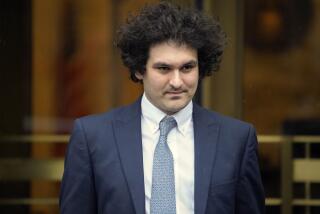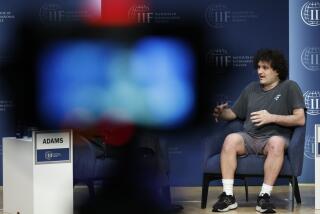BofA’s Lewis faces anger of investors
- Share via
Bruised by a year of financial catastrophe, some bank shareholders are out for revenge as the corporate annual meeting season approaches -- with Bank of America Corp. Chairman and Chief Executive Kenneth D. Lewis a prominent target.
His critics, who are calling on shareholders to vote him off the company’s board at its annual meeting April 29, cite the bank’s moves last year to acquire two struggling firms, mortgage giant Countrywide Financial Corp. and brokerage powerhouse Merrill Lynch & Co.
The $50-billion Merrill deal was followed by huge losses at the Wall Street firm and a scandal over bonuses paid to its employees -- developments that Lewis should have foreseen, the critics say.
BofA shares have nose-dived 69% since the Merrill deal was reached, compared with a 54% decline for an index of 24 bank stocks.
“You can argue about the strategic issues from here to eternity, but they’re never going to be able to justify the acquisition” of Merrill, said Michael Garland, director of value strategies at CtW Investment Group, an advisor to union-sponsored pension funds that is calling for a “no” vote on Lewis.
When the transactions were announced, Lewis and some analysts said the acquisitions would eventually yield huge profits for the Charlotte, N.C., firm, which already was the largest U.S. bank by deposits as well as the No. 1 issuer of credit cards.
In a recent interview, Lewis, 61, called dealing with the Merrill fallout the worst experience of his career. But he argued that it would take two or three years before the Merrill and Countrywide acquisitions could be fairly evaluated. He wouldn’t discuss most details of the Merrill transaction, citing lawsuits brought by shareholders.
Merrill recorded a surprise $15-billion loss for the fourth quarter and paid out $3.6 billion in bonuses before the deal closed Jan. 1. Lewis has said he had no way to stop the widely criticized payments because Merrill was a separate company at the time.
The first round of federal bailout money, distributed after the Merrill deal was announced, included $15 billion for BofA and $10 billion for Merrill. When it became clear that Merrill’s losses would be far greater than expected, Lewis threatened to back away from the takeover. He ultimately let it go through -- but only after the government invested $20 billion more in BofA and guaranteed $118 billion in troubled assets.
The $45 billion in total bailout funds received by Bank of America is exceeded only by the federal payouts to American International Group Inc. and Citigroup Inc., which have replaced their top brass. Lewis, meanwhile, says he wants to stay on until BofA has repaid the $45 billion and his bank is earning $30 billion a year -- which he says could happen in 2011.
In a letter urging shareholders to vote “no” on Lewis and two other directors, CtW Executive Director William Patterson said Lewis and his board “transformed a bank well-positioned to weather the financial crisis into one of its most costly casualties.”
A BofA spokesman said Lewis would not comment for this article.
It would be highly unusual for a majority of shareholders to reject bank directors outright. But if large numbers vote against the reelection of key board members, it would signal a strong desire for a corporate shake-up -- a message that could resonate this year, corporate governance experts say.
“There’s a lot of frustration and anger” directed at the banking industry, said Amy Borrus, deputy director of the Council of Institutional Investors. “A lot of big institutional investors are ready to rumble.”
Glass Lewis Inc., a shareholder advisory firm that already has come out against half of Citigroup’s directors, is expected to weigh in on Bank of America this week.
The California Public Employees Retirement System, which is trying to be a lead plaintiff in a shareholder class-action lawsuit against the bank, plans to soon announce how it will vote its BofA shares.
One complaint about the Merrill deal is that Lewis should have disclosed more about the brokerage’s potential losses and the fourth-quarter bonuses before a Dec. 5, 2008, special meeting of BofA shareholders to vote on the deal.
Securities and Exchange Commission chief Mary L. Schapiro last week said the agency was “carefully reviewing the Bank of America disclosure” but didn’t indicate whether a formal enforcement investigation was under way.
BofA spokesman Robert Stickler said: “We believe we provided the appropriate and legally required disclosures prior to the special shareholder meeting.”
The company, which earned $4 billion last year despite its own $2-billion fourth-quarter loss, contends it is well-positioned for the future.
Stickler said that, unlike AIG and Citigroup, Bank of America is a fundamentally profitable company that avoided the worst excesses of the subprime fiasco and now is “very well-capitalized, with the best liquidity in the industry.”
It’s a view also held by analyst Richard Bove of Rochdale Securities, who recently rated BofA as a “buy,” brushing aside the concerns of angered shareholders as shortsighted.
“The company is so large that it will mirror events in the United States economy,” Bove wrote. Once the recession ends, “Bank of America will have the strongest competitive advantages that it has ever had in its history.”
--
More to Read
Inside the business of entertainment
The Wide Shot brings you news, analysis and insights on everything from streaming wars to production — and what it all means for the future.
You may occasionally receive promotional content from the Los Angeles Times.











